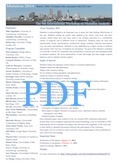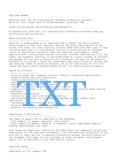The 9th International Workshop on Mutation Analysis (Mutation 2014), 31 March 2014 Cleveland (associated with ICST 2014)
*New* Program announced. *New* Keynote speaker announced. Call for Papers: Mutation is acknowledged as an important way to assess the fault-finding effectiveness of tests sets. Mutation testing has mostly been applied at the source code level, but more recently, related ideas have also been used to test artifacts described in a considerable variety of notations and at different levels of abstraction. Mutation ideas are used with requirements, formal specifications, architectural design notations, informal descriptions (eg use cases) and hardware. Mutation is now established as a major concept in software and systems V&V and uses of mutation are increasing. Mutation Analysis 2014 (Mutation 2014) is the ninth in the series of international workshops focusing on mutation. It will take place in March 31, 2014 in Cleveland. The workshop will be held in conjunction with the seventh International Conference on Software Testing, Verification, and Validation (ICST 2014). Accepted papers will be published as part of the ICST proceedings. The goal of the Mutation workshop is to provide a forum for researchers and practitioners to discuss new and emerging trends in mutation analysis. We invite submissions of both full-length and short-length research papers as well as industry practice papers. Topics include but are not limited to:
|
|
|


